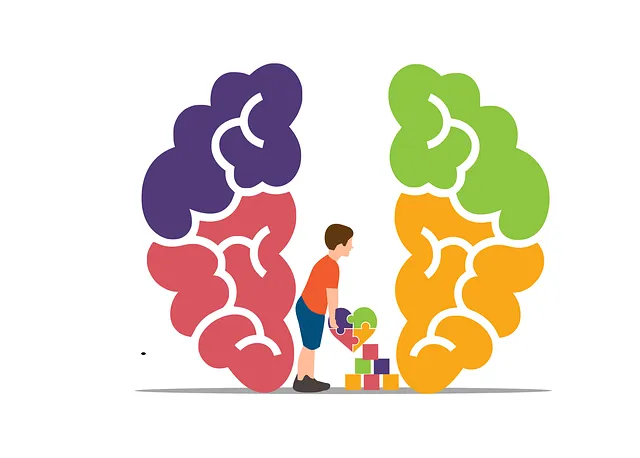In Boulder, Kaiser Permanente's comprehensive mental health coverage supports innovative coaching programs for improved well-being. These programs leverage evidence-based practices like CBT and mindfulness, personalized goal setting, virtual access, and podcast series to enhance engagement and reduce anxiety. Tailored to diverse populations, these coaching models measure success through both quantifiable metrics and client reflections, ensuring effective, needs-driven mental wellness support in the Boulder area.
Mental wellness coaching programs are gaining traction as effective tools for personal growth. This article explores the development of such programs, focusing on Boulder’s perspective regarding Kaiser’s mental health coverage. We delve into designing comprehensive coaching programs, integrating evidence-based practices, and measuring their impact. Understanding these elements is crucial for creating supportive environments that foster mental wellness, especially in light of questions around what Kaiser covers for mental health in Boulder.
- Understanding Mental Health Coverage in Kaiser
- Designing Effective Coaching Programs for Wellness
- Incorporating Evidence-Based Practices in Coaching
- Measuring and Evaluating Coaching Program Impact
Understanding Mental Health Coverage in Kaiser

In Boulder and beyond, understanding mental health coverage is paramount, especially when considering Kaiser as an option. Kaiser Permanente, a renowned healthcare provider, offers comprehensive mental health services aimed at improving overall well-being. Their plans typically include a range of mental wellness coaching programs, from individual therapy to group support sessions, ensuring access to professional guidance for various mental health concerns.
For those seeking to enhance their self-care routine development for better mental health, Kaiser’s coverage can be a significant advantage. Not only does it encourage burnout prevention by providing resources for stress management and emotional well-being, but it also includes risk management planning for mental health professionals, fostering a supportive environment for both patients and practitioners.
Designing Effective Coaching Programs for Wellness

Designing effective coaching programs for wellness involves understanding the unique needs and challenges of individuals seeking mental health support. A well-structured program should incorporate evidence-based practices such as cognitive behavioral therapy, mindfulness techniques, and stress reduction methods to address various psychological issues. In today’s digital era, where Kaiser’s coverage of mental health services in Boulder is a significant consideration for many, innovative coaching models can be delivered virtually, making access more convenient.
One effective strategy is integrating anxiety relief techniques into the coaching process, as anxiety disorders are prevalent among individuals seeking wellness support. A comprehensive program might include personalized goal setting, regular check-ins, and the utilization of mental wellness podcast series production to enhance engagement and knowledge transfer. Tailoring these programs to cater to diverse populations ensures inclusivity and effectiveness in promoting mental well-being.
Incorporating Evidence-Based Practices in Coaching

Incorporating evidence-based practices is a cornerstone of effective mental wellness coaching programs, especially considering the growing importance of mental health awareness. Techniques like cognitive behavioral therapy (CBT), mindfulness, and solution-focused brief therapy have been shown to significantly improve client outcomes. For instance, CBT helps individuals identify and challenge negative thought patterns, reducing symptoms of anxiety and depression. Mindfulness practices promote present-moment awareness, enabling clients to manage stress more effectively. These strategies are well-documented in research, ensuring coaches provide supported and proven approaches.
Boulder’s mental health landscape offers diverse resources, including what Kaiser covers for mental health services, making access to care more accessible. However, a unique aspect of coaching lies in its personalization. Coaches can tailor these evidence-based practices to meet individual needs, combining techniques like empathy building strategies to foster strong therapeutic alliances. By merging established methodologies with personalized support, coaching programs can offer transformative experiences, helping clients achieve lasting anxiety relief and improved mental wellness.
Measuring and Evaluating Coaching Program Impact

Measuring the impact of mental wellness coaching programs is a crucial step in understanding their effectiveness and ensuring they meet the needs of participants. In the context of Boulder, where Kaiser covers mental health services, coaches can utilize various assessment tools to gauge progress. These evaluations should extend beyond typical client feedback to incorporate quantifiable metrics, such as changes in anxiety levels, depression scores, and overall life satisfaction. By employing standardized questionnaires and pre-post assessments, coaches can accurately track improvements related to self-care routine development for better mental health, social skills training, and conflict resolution techniques.
Additionally, qualitative data from client reflections and interviews provide valuable insights into the program’s impact on their lives. This two-pronged approach—combining quantitative and qualitative measures—enables a holistic understanding of how coaching influences participants’ mental wellness journeys. It also helps coaches identify areas for improvement within their programs, ensuring they remain effective in supporting individuals towards enhanced psychological well-being.
Mental wellness coaching programs, enhanced by evidence-based practices, can significantly improve individual well-being. As Boulder residents increasingly seek support for their mental health, understanding Kaiser’s coverage and implementing effective coaching strategies is vital. By incorporating measurable evaluations, coaches can ensure their programs cater to the unique needs of clients, ultimately fostering a healthier community in line with expanding mental health awareness. Remember that, in this context, “Boulder does Kaiser cover mental health” inquiries point to the importance of accessible, tailored care solutions.






